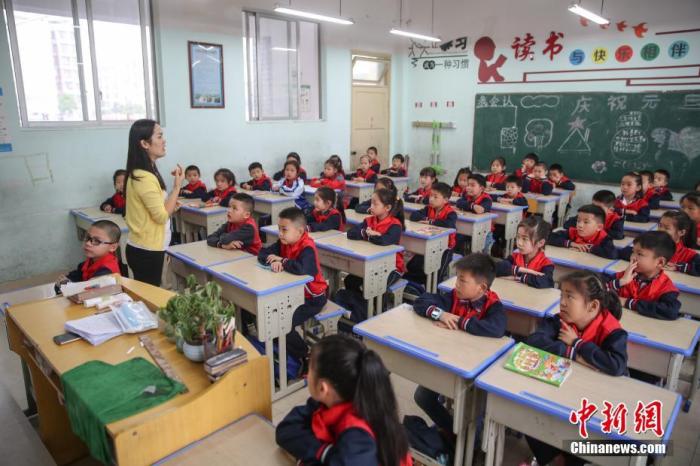China News Service, April 21, Chen Xiyuan, director of the National Student Financial Aid Management Center of the Ministry of Education, pointed out on the 21st that the student financial assistance management system will be further standardized, the supervision and management responsibilities at all levels, the student funding procedures, the fund management, and the information management will be further standardized.
Data map: Primary school students listen carefully in class (the picture has nothing to do with the text).
Photo by China News Agency reporter Qu Honglun
On the 21st, the State Information Office held a press conference on the "National Basic Public Service Standards (2021 Edition)".
At the meeting, a reporter asked questions and said that in the field of learning and teaching, the "National Standards 2021" mainly clarified the standards for various student funding projects at all levels.
How effective are these student subsidy programs to ensure learning and teaching?
In the future, what are the considerations to ensure that students can learn and teach?
Chen Xiyuan said that the Party Central Committee and the State Council attach great importance to the work of scholarship and financial aid for students with financial difficulties.
At present, my country has established a relatively complete national student subsidy policy system, which has realized "not letting a student drop out of school due to family financial difficulties" in the system, which provides a strong guarantee for learning and teaching.
Among them, pre-school education: In accordance with the principle of "local first, central subsidy", local governments will subsidize children in financial difficulties, orphans and disabled children from families in inclusive kindergartens.
Compulsory education: Tuition and miscellaneous fees are exempted for all compulsory education students in both urban and rural areas, textbooks are provided free of charge, living expenses are subsidized for students from poor families, and nutritional dietary subsidies are provided for rural compulsory education students in poverty-stricken areas.
Ordinary high school education: provide national bursaries for students with financial difficulties, and exempt students with financial difficulties such as original files and registration cards.
Secondary vocational education: tuition exemption for all rural students, urban agriculture-related majors and students with financial difficulties in families, students in ethnic areas, and opera performance students, and for first and second-year agriculture-related students and non-agricultural-related students with family financial difficulties State grants.
Chen Xiyuan pointed out that the full implementation of various student financial aid policies has effectively reduced the financial burden of financially disadvantaged student families, strengthened the people's sense of gain, and made greater contributions to running a satisfactory education for the people and promoting economic and social development.
First, it has ensured that students from poor families do not drop out of school due to economic problems, promoted the increase in enrollment and consolidation rates at all stages of education in our country, and promoted educational equity and social equity.
The second is to improve the living standards of poor rural students in poor areas, significantly improve their nutritional structure, and enhance their physical fitness.
The third is to promote the development of secondary vocational education and the adjustment of high school education structure, and promote the training of skilled talents.
Fourth, it has effectively promoted children from poor families to achieve high-quality poverty alleviation through education.
Chen Xiyuan said that student aid is a long-term task.
In the next step, the Ministry of Education will comprehensively improve the service level of student financial assistance, and further weave and secure the student financial assistance network.
One is to work hard to improve policies.
According to the level of economic and social development and the assistance needs of students with financial difficulties, the scope and standards of funding will be adjusted in a timely manner to further improve the funding policy to provide solid policy guarantees for students from families with financial difficulties to successfully enroll, complete their studies, and grow into talents.
The second is to work hard on standardized management.
Further standardize the student funding management system, standardize the supervision and management responsibilities at all levels, standardize student funding procedures, standardize fund management, and standardize information management.
The third is to work hard on precise funding.
Efforts to achieve accurate budget allocation, accurate funding targets, accurate funding standards, and accurate funding time.
The fourth is to work hard on funding and educating people.
Provide key assistance to students with financial difficulties in all aspects of education and teaching, and form a funding and education mechanism with full participation, coordination of various departments, and overall coordination of education and teaching links to promote the growth of students with financial difficulties. .

